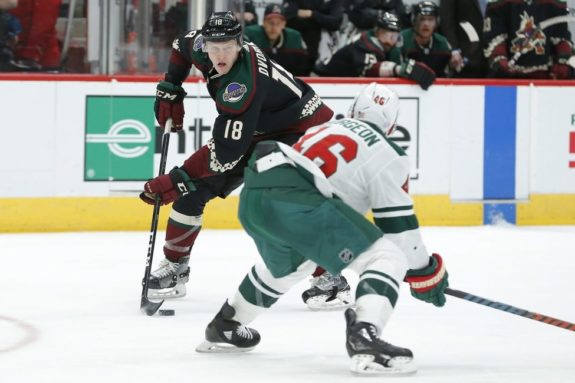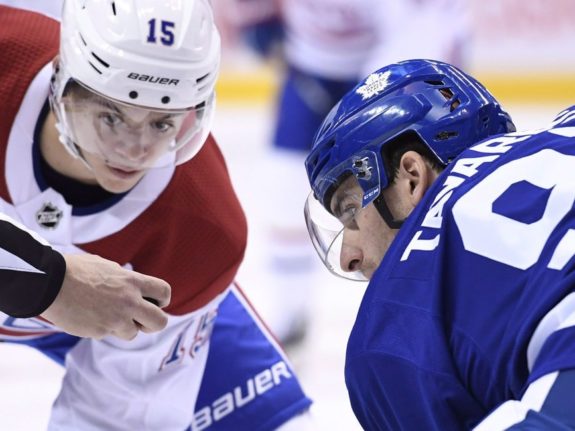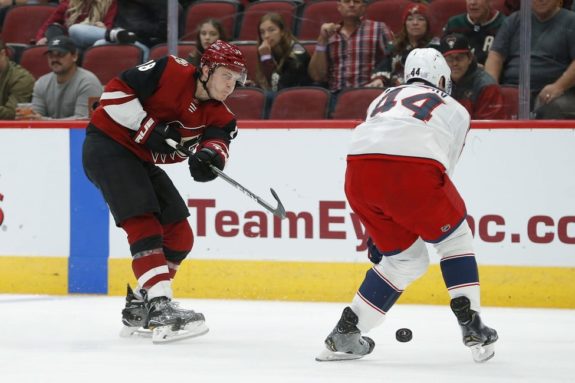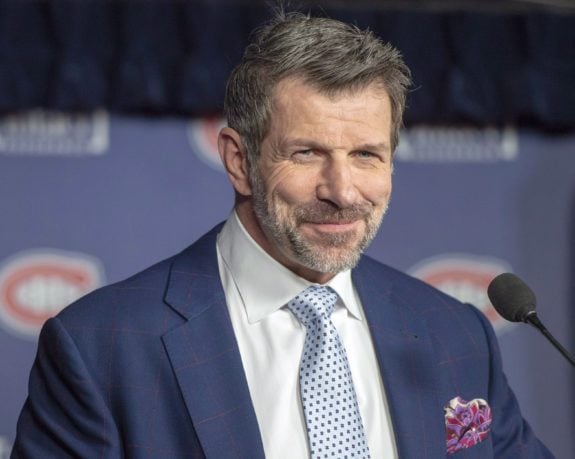Montreal Canadiens general manager Marc Bergevin may have won the battle, but the war is still to be decided, following his acquisition of Christian Dvorak from the Arizona Coyotes.

Dvorak was of course acquired after the Canadiens opted not to match the Carolina Hurricanes’ offer sheet to which they signed forward Jesperi Kotkaniemi. The decision to forego paying Kotkaniemi over $6.1 million next season probably makes the most sense right now for Bergevin. Truth be told, so does acquiring Dvorak, who fills an open slot down the middle, with Kotkaniemi now gone, as well as Phillip Danault. The long-term ramifications are the problem.
Bergevin Gets His Second-Line Center
In Dvorak, the Canadiens are getting an undeniably established second-line center. At 25 years of age, Dvorak just scored 17 goals and 31 points in 56 games, which would put him on pace for ~25 goals and 46 points over a full season. Both would be career highs for a player who is arguably in his prime production years.
Considering Kotkaniemi just scored five goals and 15 assists last season, the Canadiens undeniably upgraded on offense with Dvorak, even assuming Kotkaniemi was poised to take a leap forward this coming season with legitimate top-six deployment. It’s entirely possible Dvorak will find himself in Danault’s old spot, beside Brendan Gallagher, which Kotkaniemi had generally been projected to fill had he been re-signed.

Dvorak also compares favorably to Danault from an offensive perspective, additionally never losing more face-offs than he’s won, aside from in his 2016-17 rookie season (notably winning over 55% from 2018-20). However, on the defensive side, the Canadiens are clearly going to still miss Danault, as a top 10 finalist in Frank J. Selke Trophy voting in each of the last three seasons. That was always going to be case, even with Kotkaniemi, though.
Bergevin Overpays for Dvorak
All things taken into consideration then, Bergevin could have done much worse, turning around and getting Dvorak to replace Kotkaniemi. That having been said, negotiating from a clear-cut position of weakness, Bergevin overpaid.
True, the first-round and second-round picks he gave the Coyotes are the kind of compensation one might expect to acquire a player of Dvorak’s caliber at a trade deadline, especially since he’s under contract until 2025 (at a cost-effective $4.45 million cap hit). However, that’s the kind of move a clear-cut contender would make.
The Canadiens may be better on paper than they were prior to the offer sheet being signed. However, they aren’t as good as the team that reached the Stanley Cup Final… after having just barely earned a playoff spot by the skin of their teeth. As a result, the Canadiens making the playoffs is far from certain, even with the short-term upgrade at center Dvorak provides over Kotkaniemi.

The emphasis should be on “short-term” for the simple reason that Dvorak is unlikely to develop into anything more than he has at this point, and there’s nothing wrong with that in a vacuum. However, when you’re using him to replace a 21-year-old former third-overall pick, it’s an issue. It’s even hard to consider this a trade, for the simple reason the Canadiens gave up more than they got as compensation for Kotkaniemi (2022 first and third-round picks). The 2022 first-round pick going to the Coyotes will be the higher of the two between the Hurricanes’ and the Canadiens’.
The Canadiens thankfully got top-10 protection for the picks at the Shane Wright 2022 NHL Entry Draft, which is critical. If one or both of the picks fall in the top 10, the Coyotes get the lesser selection. It still doesn’t take away from the fact that at their core these two transactions equate to Bergevin effectively valuing Dvorak more, when Kotkaniemi, who has undeniably struggled from a production standpoint, having been deployed as a third-line center, arguably has so much higher to go.
Take the fact that Coyotes got greater compensation than the Canadiens out of the equation for a moment. It’s fair to assume anyone who’s reasonable, Bergevin and head coach Dominique Ducharme included, did not enter this offseason looking to offload Kotkaniemi. It’s also fair to assume, if they had, Dvorak would not have been what they had been looking for in exchange (at least not all). You simply don’t give up on a third-overall pick at 21 years old right before he’s likely going to be given a chance to show how he factors into the top six. At least you shouldn’t.
Of course, it’s also fair to assume that anyone who’s reasonable wouldn’t have signed the offer sheet and given Kotkaniemi $6.1 million a year before Nick Suzuki’s contract is coming due. However, there’s still no way to justify getting a second-line center like Dvorak “for” Kotkaniemi, for all intents and purposes.
Dvorak vs. Kotkaniemi vs. a First-Round Pick
You can make a case that Dvorak is worth a first-round pick, even if he was taken at No. 58 back in 2014, based solely on how he stacks up against his peers taken that draft. He has the 16th-most points so far after all, but, just like for Jared McCann, who was taken at No. 24 and has 11 more points in his career right now, you wouldn’t expect him to fetch a first-round pick anymore either. For example, McCann was left unprotected in the 2021 NHL Expansion Draft. Before that, he was traded by the Pittsburgh Penguins to the Toronto Maple Leafs for second-round pick Filip Hallander and a 2023 seventh-round pick.
Florida Panthers forward Sam Bennett, who was taken at No. 4 and has the same amount of points as McCann, earned the Calgary Flames a second-round pick (and second-round pick Emil Heineman) in this past crapshoot of a draft (with a sixth-round pick going back the other way). So, while Dvorak has perhaps exceeded expectations and found his niche as a defensively aware second-line center in this league, he’s simply not worth a first-round pick (plus a second).
Kotkaniemi may not pan out, but that’s not the issue here, not anymore. The issue is the Canadiens, with their backs presumably against the wall, acquired his replacement literally a matter of hours later for the first-round pick they got in exchange, when, realistically speaking, they’re no longer in Stanley Cup contention. It’s admittedly not necessarily the case, but the Canadiens shouldn’t have felt pressured to flip the pick in a season in which the Canadiens are presumably out Shea Weber, the ex-center of their top line, Danault, and maybe Carey Price to start, following knee surgery.
Acquiring Dvorak is perfectly fine, but for the right price, which isn’t a first-round pick. The Canadiens should have either played the market to a greater extent and used it to acquire someone else who’s more valuable or kept it, even if only for the simple reason that the 2022 draft is likely to be significantly stronger than the 2021 edition and a player like Dvorak, while useful, is not a player you should hope to get with a pick of that magnitude. And yet the Canadiens just did.
Bergevin just got the second-line center he probably wanted, conceivably improving his lineup for right now in the process. There had of course been rumors that Dvorak had been his target, but, even so, akin to friendly fire, it’s not necessarily something you would expect, especially from a GM coming off a top-three finish for General Manager of the Year Award honors. It’s not a move you would hope for, at least.

At this juncture, you essentially know what you have in Dvorak, and it’s an undeniably useful top-six forward, but is it enough? It’s probably going to take a while to properly assess how Bergevin made out here, but he definitely gave up a lot, namely in the form of potential.
Kotkaniemi may not have lit the lamp with regularity during the regular season, but the nine goals in 29 playoff games at least hint at there being something greater there. It’s something Dvorak, with three points in nine career postseason contests, has yet to show himself. So, while Kotkaniemi has a ways to go before making Bergevin look like a loser in this set of moves, so too does Dvorak to make him look like a winner.
By acquiring Dvorak, Bergevin has arguably signaled the intention to follow up the run to the Stanley Cup Final with a playoff appearance at the very least. He’ll be hard-pressed to get it with the Canadiens playing in the reformed Atlantic Division, but it’s definitely a possibility. Dvorak fills an undeniable need as a second-line center to help get them there, after all. However, considering there had been hopes Kotkaniemi would develop into a No. 1 center, whether he gets there or not, the Canadiens downgraded in at least one key respect here, with regard to expectations. They’ve been substantially lowered, especially with regard to the worth of a first-round pick, and that’s significant.
